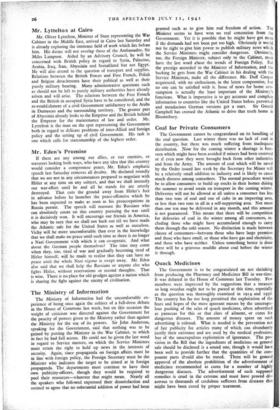The Ministry of Information
The Ministry of Information had the uncomfortable ex- perience of being once again the subject of a full-dress debate in the House of Commons last week, but on this occasion the weight of criticism was directed against the Government for the paucity of powers given to the Ministry rather than against the Ministry for the use of its powers. Sir John Anderson, speaking for the Government, said that nothing was to be gained by putting the Minister in the War Cabinet, to which in fact he had full access. He could not be given the last word in regard to Service matters, on which the Service Ministers must retain the right to hold up news in the interests of security. Again, since propaganda on foreign affairs must be in line with foreign policy, the Foreign Secretary must be the Minister who indicates the target to be aimed at in foreign propaganda. The departments must continue to have their own publicity-officers, though they would be required to pool their resources—whatever that might mean. Nearly all the speakers who followed expressed their dissatisfaction and seemed to agree that no substantial addition of power had been granted such as to give him real freedom of action. The Minister seems to have won no real concession from the Government. Yet it is possible that he might have got more if the demands had not been put too high. Obviously it would not be right to give him power to publish military news Which the Service Ministers might consider dangerous. Obviously, too, the Foreign Minister, subject only to the Cabinet, must have the last word about the trends of Foreign Policy. But the prestige accorded to the Minister of Information, and the backing he gets from the War Cabinet in his dealing with the Service Ministers, make all the difference. Mr. Duff Cooper acquiesced, with no enthusiasm, in the latest compromise, but no one can be satisfied with it. Issue of news for home con- sumption is actually the least important of the Ministry's functions. What is imperative is to get accurate and complete information to countries like the United States before perverted and mendacious German versions get a start. Sir Gerald Campbell has crossed the Atlantic to drive that truth home in Bloomsbury.


























 Previous page
Previous page